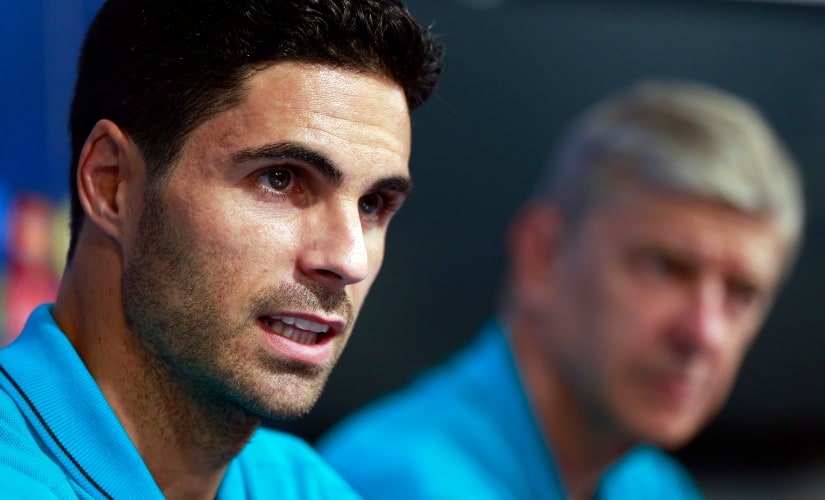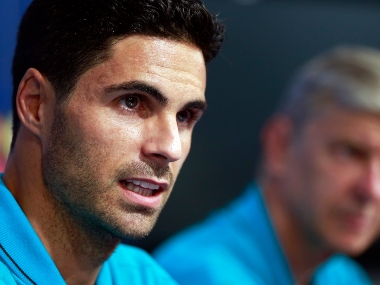Shortly after the news was made official, scribes called up the new Arsenal manager, Mikel Arteta’s former team-mates to get the inside scoop on the kind of person he is and his suitability for the role. Between all the gushing praise and the lyrical testimonials was a quote by Louis Saha, his ex-Everton teammate published by France Football that cut the conversation into two like a butter knife through a spread of marmite: “He is quite an introvert because he is an extremely serious person. I am a little surprised that he’s getting to start out as a number one at a club of this stature. It’s unusual." What exacerbated Unai Emery’s pains as Arsenal manager was not merely the loss of persona of his teams on the pitch but the lack of soundbites and quotable quotes off of it. Press conferences, when you give it a thought, are tribalistic mini ceremonies where a group of scribes gather around the team’s shaman (or manager) with a voracious appetite for insight, asking them to look into the events of a future showdown. The manager offers hackneyed responses masked in enthralling metaphors, smilies, anecdotes, puns, alliterations, controversial takes, that make for eye-catching despatches across the land, inciting or exciting his team’s supporters. With Jose Mourinho quoting Nelson Mandela in his inaugural press conference at Tottenham, no bridge is too far. Nothing better than slogans and catchphrases you can print on your favourite mug or a hoodie rallying the modern fans together. For what its worth, the modern football club, regenerative cell research holds as much currency as content; as viral exposure on social media looks to reel in from the catchment area of yet-to-be-converted fans and placate the existing ones. [caption id=“attachment_7811141” align=“alignnone” width=“825”] In this 2 August 2015 photo, Arsenal’s Mikel Arteta, centre, lifts the Community Shield trophy after his team beat Chelsea 1-0 in the English Community Shield match at Wembley Stadium, London. AP[/caption] Their former manager Unai Emery was woefully unimaginative in that aspect of the game. The language barrier was made a mockery out of and left no room for verbal gymnastics, nevermind platitudes that pandered the press. The journalists were bored to the very edge of their seats, lolling their heads, containing yawns and catching power naps, knowing there are no ‘idioms to chase’ (in the words of sportswriter Hugh McIllvanney), and not getting their monies worth. There was little surprise that a huge majority of the press turned on him as quickly as they did. Mikel Arteta will have to be fully cognizant of these factors. This is an institution that has lost its way. The former Spanish playmakers accepted that observation at his unveiling: “That’s what I’m sensing. I want to take some steps and start to understand the reasons why. There must be a story, history behind it, and I will have to understand it as quickly as I can, to implement certain changes that will be quick wins, for the players, the staff and everybody. That is the challenge now.” The modern football manager is not simply a tactician and a coach. A look at Liverpool and Jurgen Klopp provide the perfect template as to how a manager fulfils his role as someone akin to a CEO coupled as a brand ambassador, spokesman in perfect syncopation with his on-field duties. Inside Anfield for instance, a video feature on the club’s YouTube channel that takes you behind the scenes at Liverpool raked in over 7 million GBP over the past year. That fee which was then used to procure their latest signing Takumi Minamino, who in turn will exponentially boost shirt sales in Japan and in the Asian market. There were more subscribers to the clubs official video service LFC GO than under any Liverpool manager since its inception. Whereas at Arsenal, a lack of access and a whole lot of stiff-upper-lipped defensiveness in crisis made fans and journalists feel alienated. AFTV’s affront, constantly questioning the competency of the club’s decision-makers compounded the unease and made both parties resent each other, widening the chasms. Players, notedly, were barred from partaking in feature-length interviews, and there was a general distrust as to what they’d vent if they were given the permission to do so. And they were fined if they spoke to any of their regional outlets from their native nations. That didn’t stop the likes of Mesut Ozil and Alexander Lacazette speaking out on social media. The latter, a repeat offender, surreptitiously liking posts on Instagram that demanded Unai Emery and club captain Granit Xhaka’s exits. The rift between the players and the management is deeper and wider than it has been in over 23 years at the North London club. And what Mikel Arteta will feel walking into the Arsenal dressing room the first time is the icky, sticky air of dissent hanging in the air. Can he be vocal enough to quiet all the dissenters around him? Arteta was unequivocal in his first press conference as Arsenal manager: “I don’t want players to be hiding (behind social media). I want them to take responsibility for their jobs and deliver passion and energy into this football club. Anyone who doesn’t buy into this philosophy, or has a negative influence is not good enough for club culture.” [caption id=“attachment_7811171” align=“alignnone” width=“825”]
 Arsenal hired Mikel Arteta as manager on 20 December 2019, hoping its former midfielder can turn around the fortunes of the ailing London club. AP[/caption] Arteta enthuses that he’s walking into this appointment with his eyes open. His first brush up with this aggravating negativity was when he visited the Emirates last Sunday, in his capacity as Manchester City’s assistant manager, where he saw his side win 0-3, but also says he started sensing the beginnings of it while he was still an Arsenal player in 2016: “It wasn’t only the performance. It was the atmosphere and energy that I perceived when I was still working around the place.” What Arsenal want is a man at the helm who can endow identity to their club from the top down, and make the ‘show’ and the ‘business’ in ‘show-business’ mutually inclusive; and crucially, also someone who can heal the club. That process of diagnosing the disease begins, according to him, begins in the conversations with the backroom staff, more specifically Freddie Ljungberg, Arsenal’s interim manager for their game vs Everton this weekend, while he watches on from the stands. His intention is to cause the least amount of disruption possible in times as fragile as this when Arsenal find themselves in 10 positions in the league - their worst-ever start to a Premier League campaign. The British disagreement with marmite as a bread spread is deeply-rooted in the country’s general psyche: the general consensus is that you either love it or deem it absolutely an ill fit to be associated with any form of the breakfast routine. Mikel Arteta in his time as Manchester City coach has been regarded highly in the football coaching circles as an exceptionally, tactically astute number two, with in-game insights that rival some of the best in the game, all the while passing none other than Pep Guardiola’s obsessively, compulsive lofty standards. He’s known as someone who decorates his Manchester apartment walls with post-its and tactical diagrams with eclectic tactical influences ranging from the New Zealand All Blacks Rugby teams to Toronto Raptors. It remains to be seen if his book-smarts translates to the street-smarts that players respect. They will, like marmite, will either love him or hate him.
Arsenal hired Mikel Arteta as manager on 20 December 2019, hoping its former midfielder can turn around the fortunes of the ailing London club. AP[/caption] Arteta enthuses that he’s walking into this appointment with his eyes open. His first brush up with this aggravating negativity was when he visited the Emirates last Sunday, in his capacity as Manchester City’s assistant manager, where he saw his side win 0-3, but also says he started sensing the beginnings of it while he was still an Arsenal player in 2016: “It wasn’t only the performance. It was the atmosphere and energy that I perceived when I was still working around the place.” What Arsenal want is a man at the helm who can endow identity to their club from the top down, and make the ‘show’ and the ‘business’ in ‘show-business’ mutually inclusive; and crucially, also someone who can heal the club. That process of diagnosing the disease begins, according to him, begins in the conversations with the backroom staff, more specifically Freddie Ljungberg, Arsenal’s interim manager for their game vs Everton this weekend, while he watches on from the stands. His intention is to cause the least amount of disruption possible in times as fragile as this when Arsenal find themselves in 10 positions in the league - their worst-ever start to a Premier League campaign. The British disagreement with marmite as a bread spread is deeply-rooted in the country’s general psyche: the general consensus is that you either love it or deem it absolutely an ill fit to be associated with any form of the breakfast routine. Mikel Arteta in his time as Manchester City coach has been regarded highly in the football coaching circles as an exceptionally, tactically astute number two, with in-game insights that rival some of the best in the game, all the while passing none other than Pep Guardiola’s obsessively, compulsive lofty standards. He’s known as someone who decorates his Manchester apartment walls with post-its and tactical diagrams with eclectic tactical influences ranging from the New Zealand All Blacks Rugby teams to Toronto Raptors. It remains to be seen if his book-smarts translates to the street-smarts that players respect. They will, like marmite, will either love him or hate him.
Mikel Arteta has left his role as Manchester City assistant manager to replace fellow Spaniard Unai Emery, who was sacked by Arsenal following a run of poor results last month
Advertisement
End of Article


)

)
)
)
)
)
)
)
)



